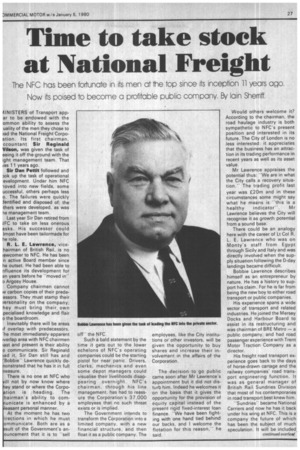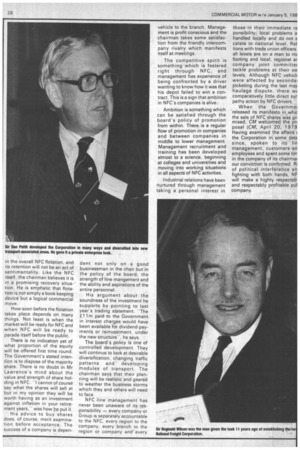Thne to take stock at National Freight
Page 29

Page 30

If you've noticed an error in this article please click here to report it so we can fix it.
ne NFC has been fortunate in its men at ne top since its inception 11 years ago. Now its poised to become a profitable public company. By am n Sherriff.
IINISTERS of Transport appar to be endowed with the ommon ability to assess the uality of the men they chose to .?.ad the National Freight Corpoation. Its first chairman, ccountant Sir Reginald Vilson, was given the task of eeing it off the ground with the ight management team. That /as 11 years ago.
Sir Dan Pettit followed and Dok up the task of operational evelopment. Under him NFC loved into new fields, some uccessful, others perhaps less o. The failures were quickly Jentified and disposed of; the thers were developed, as was le management team.
Last year Sir Dan retired from JFC to take on less onerous asks. His successor could lmost have been tailormade for he role.
R. L. E. Lawrence, vicehairman of British Rail, is no iewcomer to NFC. He has been n active Board member since he outset. He had been able to nfluence its development for en years before he "moved in"
o Argosy House.
Company chairmen cannot lecarbon copies of their predeessors. They must stamp their iersonality on the company; hey must bring their own pecialised knowledge and flair
o the boardroom.
Inevitably there will be areas if overlap with predecessors. The most immediately apparent • verlap area with NFC chairmen )ast and present is their ability o communicate. Sir Reginald )ad it, Sir Dan still has and 'Bobbie" Lawrence quickly denonstrated that he has it in full neasure.
There is no one at NFC who vill not by now know where hey stand or where the Corpoation is heading. The hairman's ability to comnunicate is enhanced by a ileasant personal manner.
At the moment he has two irections in which he must ommunicate. Both are as a sult of the Government's anouncement that it is to "sell off" the NFC.
Such a bald statement by the time it gets out to the lower echelons of NFC's operating companies could be the starting pistol for near panic. Drivers, clerks, mechanics and even some depot managers could visualise their livelihoods disapbearing overnight. NFC's chairman, through his line management, has had to reassure the Corporation's 37,000 employees that no such threat exists or is implied.
The Government intends to transform the Corporation into a limited company, with a new financial structure, and then float it as a public company. The employees, like the City institutions or other investors, will be given the opportunity to buy shares and increase their involvement in the affairs of the Corporation.
The decision to go public came soon after Mr Lawrence's appointment but it did not disturb him. Indeed he welcomes it on the basis that it gives the opportunity for the provision of equity capital instead of the present rigid fixed-interest loan finance. "We have been fighting with one hand tied behind our backs, and I welcome the flotation for this reason," he said.
Would others welcome it? According to the chairman, the road haulage industry is both sympathetic to NFC's present position and interested in its future. The City of London is no less interested: it appreciates that the business has an attraction in its trading performance in recent years as well as its asset value.
Mr Lawrence appraises the potential thus: ''We are in what the City calls a recovery situation." The trading profit last year was £20m and in these circumstances some might say what he means is "this is a healthy indicator". Mr Lawrence believes the City will recognise it as growth potential from a sound base.
There could be an analogy here with the career of Lt Col R. L. E. Lawrence who was on Monty's staff from Egypt through Sicily and Italy and was directly involved when the supply situation following the D-day landings became difficult.
Bobbie Lawrence describes himself as an entrepreneur by nature. He has a history to support his claim. For he is far from being the new boy to either road transport or public companies.
His experience spans a wide sector of transport and related industries. He joined the Mersey Docks and Harbour Board to assist in its restructuring and was chairman of BRE Metro — a public company; and had road passenger experience with Trent Motor Traction Company as a director.
His freight road transport experience goes back to the days of horse-drawn cartage and the railway companies' road transport engineering function. It was as general manager of British Rail Sundries Division that most of his contemporaries in road transport best knew him,
"Sundriesbecame National Carriers and now he has it back under his wing at NFC. This is a• company the future of which has been the subject of much speculation. It will be included
in the overall NFC flotation, and its retention will not be an act of sentimentality. Like the NFC itself, the chairman believes it is in a promising recovery situa' tion. He is emphatic that flotation is not simply a book keeping device but a logical commercial move.
How soon before the flotation takes place depends on many things. Not least is when the market will be ready for NFC and when NFC will be ready to parade itself before the public.
There is no indication yet of what proportion of the equity will be offered first time round. The Government's stated intention is to dispose of the majority share. There is no doubt in Mr Lawrence's mind about the value and strength of share holding in NFC. "I cannot of course say what the shares will sell at but in my opinion they will be worth having as an investment against inflation in your retirement years,'" was how he put it.
His advice to buy shares does, of course, merit examination before acceptance. The success of a company is depen
dent not only on a good businessman in the chair but in the policy of the board, the strength of line mangement and the ability and aspirations of the entire personnel.
His argument about the soundness of the investment he supports by pointing to last year's trading statement. -The -Ulm paid to the Government in interest charges would have been available for dividend.payments or reinvestment, under the new structure'', he says.
The board's policy is one of controlled development. They will continue to look at desirable diversification, changing traffic patterns and developing modules of transport. The chairman says that their planning will be realistic and geared to weather the business storms which they and others will need to face.
NFC dine management has never been unaware of its responsibility — every company or Group is separately accountable to the NFC, every region to the company, every branch to the region or company and every vehicle to the branch. Management is profit conscious and the chairman takes some satisfaction from the friendly intercompany rivalry which manifests itself at meetings.
The competitive spirit is something which is fostered right through NEC, and management has experience of being confronted by a driver wanting to know how it was that his depot failed to win a contract. This is a sign that ambition in NFC's companies is alive.
Ambition is something which can be satisfied through the board's policy of promotion from within. There is a regular flow of promotion in companies and between companies in middle to lower management. Management recruitment and training has been developed almost to a science, beginning at colleges and universities and moving into working situations in all aspects of NFC activities.
Industrial relations have been nurtured through management taking a personal interest in those in their immediate re ponsibility; local problems a handled locally and do not e calate to national level. Rel tions with trade union officers all levels are on a man to footing and local, regional ar company joint committeE tackle problems at their osn levels. Although NFC vehicli were affected by secondai picketing during the last maji haulage dispute, there wz comparatively little direct syr pathy action by NEC drivers.
When the Governmei released its manifesto in whic the sale of NEC shares was pr mised, CM welcomed the pn posal (CM, April 20, 1979 Having examined the affairs c the Corporation in some dete since, spoken to its lin management, customers an employees and spent some tinin the company of its chairmar our conviction is confirmed. Ri of political interference an fighting with both hands, NF will make a highly respectab and respectably profitable pul company.
















































































